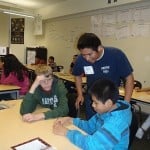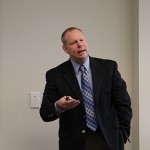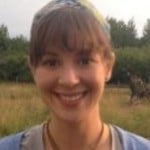Wednesday, December 11, Dr. Chelsea Schelly, Assistant Professor, Michigan Tech Department of Social Sciences presented a Green Film/Lecture event at the Forestry Building. Read the Daily Mining Gazette news article about the lecture
Half of the people in Greenland have toxic levels of PCBs in their blood. A harmful cocktail of contaminants, including mercury and dioxin, has led to fish consumption advisories in all of the Great Lakes, including Superior.
By his barren office in the Great Lakes Research Center (GLRC), one can tell that Pengfei Xue is new to campus. The assistant professor in civil and environmental engineering just started Oct. 1, but he’s already hard at work, beginning to model Great Lakes and coastal US regions using Superior, Michigan Technological University’s new supercomputer.
OK, so maybe you aren’t interested in making your own toys, cellphone cases, or glow-in-the-dark Christmas decorations. How about a brake drum?
 Michigan Tech Students to Lead Family Engineering Night at Grand Rapids Michigan Tech students will lead a Family Engineering Night on Monday, Nov. 25, at Harrison Park School in Grand Rapids. Nearly 300 K-8 students and their parents are expected to attend.
Michigan Tech Students to Lead Family Engineering Night at Grand Rapids Michigan Tech students will lead a Family Engineering Night on Monday, Nov. 25, at Harrison Park School in Grand Rapids. Nearly 300 K-8 students and their parents are expected to attend.
The Michigan Tech students are part of the University’s Society of Hispanic Professional Engineers student chapter.
“We want to get K-12 students interested in science and engineering careers, and in going to college in general,” explained Michael Briseno (Biomedical Engineering), president of the chapter. “I want to reach out to Hispanic students and their parents and let them know that college is possible for them. We also want to help them better understand what engineering is by doing some fun, hands-on activities with them.”
This year, the program will include a session for parents, “Planning for College,” led by Michigan Tech biomedical engineering graduate Uziel Mendez. Mendez is now working on a PhD in biomedical engineering at the University of Michigan.
“For parents who have not attended college, it can be difficult to know how best to encourage their children,“ explained Mendez.
Students from Society of Hispanic Professional Engineers chapters at Kettering University, Michigan State University and the University of Michigan will also be assisting with the event.
Joshua Pearce is not one for understatement. “This is the beginning of a true revolution in the sciences,” says the author of “Open-Source Lab.” For cash-strapped researchers, he could be right.
 Michigan Technological University, in collaboration with professionals from NASA, the Naval Research Laboratory, and the Space Solar Power Institute, hosted a Space Solar Power (SSP) workshop to clarify the challenges facing SSP implementation. The workshop was held in conjunction with the IEEE International Conference on Wireless for Space and Extreme Environments at Baltimore, MD, November 7 – 9, 2013. Researchers from Industry and Academia of many countries including India, Japan, UK and USA participated in this event.
Michigan Technological University, in collaboration with professionals from NASA, the Naval Research Laboratory, and the Space Solar Power Institute, hosted a Space Solar Power (SSP) workshop to clarify the challenges facing SSP implementation. The workshop was held in conjunction with the IEEE International Conference on Wireless for Space and Extreme Environments at Baltimore, MD, November 7 – 9, 2013. Researchers from Industry and Academia of many countries including India, Japan, UK and USA participated in this event.
Rob Handler is about to harvest his research. Typically, that means the gigantic kale and nice-sized onions and basil he’s growing nine stories up in the Dow Environmental Science and Engineering greenhouse. Today, though, it means the key ingredient for fish tacos, to be served at a residence hall.
 The National Mining Competition announced the three winners from the 2013 event. First place Michigan Tech, second place University of British Columbia, and third place Edwards School of Business.
The National Mining Competition announced the three winners from the 2013 event. First place Michigan Tech, second place University of British Columbia, and third place Edwards School of Business.
The winning Michigan Tech Mining team, “the fabulous four,” was Cora Hemmila, Matthew Younger, Matthew Schuman and Matthew Schwalen. The team advisor is James Murray Gillis, Instructor, Geological and Mining Engineering and Sciences, Director, Mine Safety and Health Training Program.
 A day-long orgram of special seminars was offered for university people to find the information to protect intellectual property. This free Seminar was for Inventors, Entrepreneurs, Educators and Legal Professionals featuring Speakers from the United States Patent & Trademark Office and Michigan Technological University.
A day-long orgram of special seminars was offered for university people to find the information to protect intellectual property. This free Seminar was for Inventors, Entrepreneurs, Educators and Legal Professionals featuring Speakers from the United States Patent & Trademark Office and Michigan Technological University.
